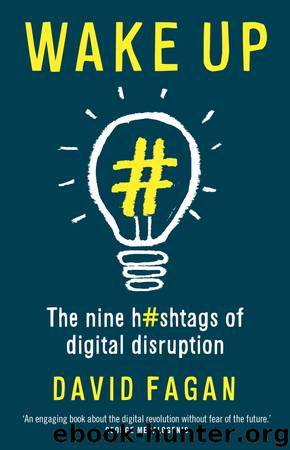Wake Up by David Fagan

Author:David Fagan
Language: eng
Format: epub
Publisher: University of Queensland Press
The language app, Duolingo, is another great illustration of this. Duolingo found its way onto smartphones in 2012 when Apple named it the iPhone app of the year – some honour in a year when more than a million apps found their way into the Apple store. Duolingo is a smart educational tool, allowing language students to do lessons as short as ten minutes to find their way through 23 languages.
Its focus is form, rather than function. Duolingo users are more likely to learn how to book, order or impress in a bar than to learn grammar and conjugation. It’s more proposition than preposition. But at 120 million users in 2016, it has might on its side.
The gamification of language, along with the badges and the convenience of short lessons on a smartphone are the winning combination. And why not? Everything now is or can be a game, keeping our inner child alive. And, also, it’s free. Digital education has all the advantages learners want (i.e. they want to make learning part of their busy lives, not have it invade their lives) and none of the costs associated with traditional delivery.
The Duolingo experience is a lot of fun. I refreshed my Italian before travelling to Europe in 2015 and was able to progress far enough to book hotels and order from menus, impressing some of my family (impressing in bars is in my past and mainly in my imagination). Along the way, I picked up a variety of badges and icons and found myself competing with a ten-year-old child who learnt the words but lacked the structure or the faccia tosta to carry it off.
The brains behind Duolingo is Luis von Ahn, Guatemalan-born but US-educated, who became a computer science professor at Carnegie Mellon University by the age of 30. Like many of the disruptors in education, he is motivated by the social power of what he does. ‘The majority of people in the world who want to learn a language are learning English because it might get them a better job,’ von Ahn tells Slate.com. ‘And learning a language usually requires money. You need to attend a good middle school that has a foreign languages department or buy a program like Rosetta Stone that can cost hundreds of dollars.’
So how does he do it for free? Well, part is patient investors who believe in the cause and see the value of building an engaged community (with all that associated data). But the real value is in turning that community into free translators for corporations. Part of the Duolingo assessment (for a free badge) is to translate a small piece of text from English into the languages you are learning (Spanish, French and Portuguese are the favourites). By having the same text translated several times, Duolingo’s programs are able to offer the best translations to companies such as the news giants CNN and BuzzFeed. This is what the experts refer to as a ‘twofer’ – offering users a free service and then taking advantage of their skill for another set of users.
Download
This site does not store any files on its server. We only index and link to content provided by other sites. Please contact the content providers to delete copyright contents if any and email us, we'll remove relevant links or contents immediately.
Life 3.0: Being Human in the Age of Artificial Intelligence by Tegmark Max(5534)
The Sports Rules Book by Human Kinetics(4367)
The Age of Surveillance Capitalism by Shoshana Zuboff(4267)
ACT Math For Dummies by Zegarelli Mark(4034)
Unlabel: Selling You Without Selling Out by Marc Ecko(3639)
Blood, Sweat, and Pixels by Jason Schreier(3596)
Hidden Persuasion: 33 psychological influence techniques in advertising by Marc Andrews & Matthijs van Leeuwen & Rick van Baaren(3536)
The Pixar Touch by David A. Price(3420)
Bad Pharma by Ben Goldacre(3413)
Urban Outlaw by Magnus Walker(3380)
Project Animal Farm: An Accidental Journey into the Secret World of Farming and the Truth About Our Food by Sonia Faruqi(3207)
Kitchen confidential by Anthony Bourdain(3071)
Brotopia by Emily Chang(3040)
Slugfest by Reed Tucker(2988)
The Content Trap by Bharat Anand(2910)
The Airbnb Story by Leigh Gallagher(2834)
Coffee for One by KJ Fallon(2615)
Smuggler's Cove: Exotic Cocktails, Rum, and the Cult of Tiki by Martin Cate & Rebecca Cate(2508)
Beer is proof God loves us by Charles W. Bamforth(2434)
